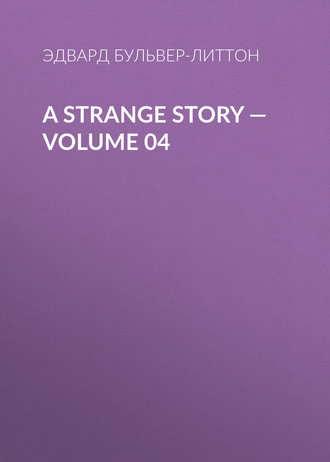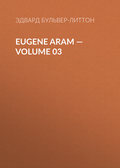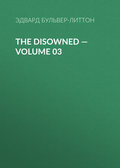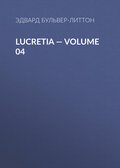
Эдвард Бульвер-Литтон
A Strange Story — Volume 04
"I did not share that opinion," wrote the narrator, "for I assured myself that Ayesha sincerely loved her awful master; and that love need excite no wonder, for Louis Grayle was one whom if a woman, and especially a woman of the East, had once loved, before old age and infirmity fell on him, she would love and cherish still more devotedly when it became her task to protect the being who, in his day of power and command, had exalted his slave into the rank of his pupil and companion. And the Indian whom Grayle had assigned to her service was allowed to have that brute kind of fidelity which, though it recoils from no crime for a master, refuses all crime against him.
"I came to the conclusion that Haroun had been murdered by order of Louis Grayle,—for the sake of the elixir of life,—murdered by Juma the Strangler; and that Grayle himself had been aided in his flight from Aleppo, and tended, through the effects of the life-giving drug thus murderously obtained, by the womanly love of the Arab woman Ayesha. These convictions (since I could not, without being ridiculed as the wildest of dupes, even hint at the vital elixir) I failed to impress on the Eastern officials, or even on a countryman of my own whom I chanced to find at Aleppo. They only arrived at what seemed the common-sense verdict,—namely, that Haroun might have been strangled, or might have died in a fit (the body, little examined, was buried long before I came to Aleppo); and that Louis Grayle was murdered by his own treacherous dependents. But all trace of the fugitives was lost.
"And now," wrote Sir Philip, "I will state by what means I discovered that Louis Grayle still lived,—changed from age into youth; a new form, a new being; realizing, I verily believe, the image which Haroun's words had raised up, in what then seemed to me the metaphysics of fantasy,—-criminal, without consciousness of crime; the dreadest of the mere animal race; an incarnation of the blind powers of Nature,—beautiful and joyous, wanton and terrible and destroying! Such as ancient myths have personified in the idols of Oriental creeds; such as Nature, of herself, might form man in her moments of favour, if man were wholly the animal, and spirit were no longer the essential distinction between himself and the races to which by superior formation and subtler perceptions he would still be the king.
"But this being is yet more dire and portentous than the mere animal man, for in him are not only the fragmentary memories of a pristine intelligence which no mind, unaided by the presence of soul, could have originally compassed, but amidst that intelligence are the secrets of the magic which is learned through the agencies of spirits the most hostile to our race. And who shall say whether the fiends do not enter at their will this void and deserted temple whence the soul has departed, and use as their tools, passive and unconscious, all the faculties which, skilful in sorcery, still place a mind at the control of their malice?
"It, was in the interest excited in me by the strange and terrible fate that befell an Armenian family with which I was slightly acquainted, that I first traced—in the creature I am now about to describe, and whose course I devote myself to watch, and trust to bring to a close—the murderer of Haroun for the sake of the elixir of youth.
"In this Armenian family there were three daughters; one of them—"
I had just read thus far when a dim shadow fell over the page, and a cold air seemed to breathe on me,—cold, so cold, that my blood halted in my veins as if suddenly frozen! Involuntarily I started, and looked up, sure that some ghastly presence was in the room. And then, on the opposite side of the wall, I beheld an unsubstantial likeness of a human form. Shadow I call it, but the word is not strictly correct, for it was luminous, though with a pale shine. In some exhibition in London there is shown a curious instance of optical illusion; at the end of a corridor you see, apparently in strong light, a human skull. You are convinced it is there as you approach; it is, however, only a reflection from a skull at a distance. The image before me was less vivid, less seemingly prominent than is the illusion I speak of. I was not deceived. I felt it was a spectrum, a phantasm; but I felt no less surely that it was a reflection from an animate form,—the form and face of Margrave; it was there, distinct, unmistakable. Conceiving that he himself must be behind me, I sought to rise, to turn round, to examine. I could not move: limb and muscle were overmastered by some incomprehensible spell. Gradually my senses forsook me; I became unconscious as well as motionless. When I recovered, I heard the clock strike three. I must have been nearly two hours insensible! The candles before me were burning low. My eyes rested on the table; the dead man's manuscript was gone!
CHAPTER XL
The dead man's manuscript was gone. But how? A phantom might delude my eye, a human will, though exerted at a distance, might, if the tales of mesmerism be true, deprive me of movement and of consciousness; but neither phantom nor mesmeric will could surely remove from the table before me the material substance of the book that had vanished! Was I to seek explanation in the arts of sorcery ascribed to Louis Grayle in the narrative? I would not pursue that conjecture. Against it my reason rose up half alarmed, half disdainful. Some one must have entered the room, some one have removed the manuscript. I looked round. The windows were closed, the curtains partly drawn over the shutters, as they were before my consciousness had left me: all seemed undisturbed. Snatching up one of the candles, fast dying out, I went into the adjoining library, the desolate state-rooins, into the entrance-hall, and examined the outer door. barred and locked! The robber had left no vestige of his stealthy presence.
I resolved to go at once to Strahan's room and tell him of the loss sustained. A deposit had been confided to me, and I felt as if there were a slur on my honour every moment in which I kept its abstraction concealed from him to whom I was responsible for the trust. I hastily ascended the great staircase, grim with faded portraits, and found myself in a long corridor opening on my own bedroom; no doubt also on Strahan's. Which was his? I knew not. I opened rapidly door after door, peered into empty chambers, went blundering on, when to the right, down a narrow passage. I recognized the signs of my host's whereabouts,—signs familiarly commonplace and vulgar; signs by which the inmate of any chamber in lodging-house or inn makes himself known,—a chair before a doorway, clothes negligently thrown on it, beside it a pair of shoes. And so ludicrous did such testimony of common every-day life, of the habits which Strahan would necessarily have contracted in his desultory unluxurious bachelor's existence,—so ludicrous, I say, did these homely details seem to me, so grotesquely at variance with the wonders of which I had been reading, with the wonders yet more incredible of which I myself had been witness and victim, that as I turned down the passage, I heard my own unconscious half-hysterical laugh; and, startled by the sound of that laugh as if it came from some one else, I paused, my hand on the door, and asked myself: "Do I dream? Am I awake? And if awake what am I to say to the common place mortal I am about to rouse? Speak to him of a phantom! Speak to him of some weird spell over this strong frame! Speak to him of a mystic trance in which has been stolen what he confided to me, without my knowledge! What will he say? What should I have said a few days ago to any man who told such a tale to me?" I did not wait to resolve these questions. I entered the room. There was Strahan sound asleep on his bed. I shook him roughly. He started up, rubbed his eyes. "You, Allen,—you! What the deuce?—what 's the matter?"
"Strahan, I have been robbed!—robbed of the manuscript you lent me. I could not rest till I had told you."
"Robbed, robbed! Are you serious?"
By this time Strahan had thrown off the bed-clothes, and sat upright, staring at me.
And then those questions which my mind had suggested while I was standing at his door repeated themselves with double force. Tell this man, this unimaginative, hard-headed, raw-boned, sandy-haired North countryman,—tell this man a story which the most credulous school-girl would have rejected as a fable! Impossible!
"I fell asleep," said I, colouring and stammering, for the slightest deviation from truth was painful to me, "and-and—when I awoke—the manuscript was gone. Some one must have entered and committed the theft—"
"Some one entered the house at this hour of the night and then only stolen a manuscript which could be of no value to him! Absurd! If thieves have come in it must be for other objects,—for plate, for money. I will dress; we will see!"
Strahan hurried on his clothes, muttering to himself and avoiding my eye. He was embarrassed. He did not like to say to an old friend what was on his mind; but I saw at once that he suspected I had resolved to deprive him of the manuscript, and had invented a wild tale in order to conceal my own dishonesty.
Nevertheless, he proceeded to search the house. I followed him in silence, oppressed with my own thoughts, and longing for solitude in my own chamber. We found no one, no trace of any one, nothing to excite suspicion. There were but two female servants sleeping in the house,—the old housekeeper, and a country girl who assisted her. It was not possible to suspect either of these persons; but in the course of our search we opened the doors of their rooms. We saw that they were both in bed, both seemingly asleep: it seemed idle to wake and question them. When the formality of our futile investigation was concluded, Strahan stopped at the door of my bedroom, and for the first time fixing his eyes on me steadily, said,—
"Allen Fenwick, I would have given half the fortune I have come into rather than this had happened. The manuscript, as you know, was bequeathed to me as a sacred trust by a benefactor whose slightest wish it is my duty to observe religiously. If it contained aught valuable to a man of your knowledge and profession, why, you were free to use its contents. Let me hope, Allen, that the book will reappear to-morrow."
He said no more, drew himself away from the hand I involuntarily extended, and walked quickly back towards his own room.
Alone once more, I sank on a seat, buried my face in my hands, and strove in vain to collect into some definite shape my own tumultuous and disordered thoughts. Could I attach serious credit to the marvellous narrative I had read? Were there, indeed, such powers given to man, such influences latent in the calm routine of Nature? I could not believe it; I must have some morbid affection of the brain; I must be under an hallucination. Hallucination? The phantom, yes; the trance, yes. But still, how came the book gone? That, at least, was not hallucination.
I left my room the next morning with a vague hope that I should find the manuscript somewhere in the study; that, in my own trance, I might have secreted it, as sleep-walkers are said to secrete things, without remembrance of their acts in their waking state.
I searched minutely in every conceivable place. Strahan found me still employed in that hopeless task. He had breakfasted in his own room, and it was past eleven o'clock when he joined me. His manner was now hard, cold, and distant, and his suspicion so bluntly shown that my distress gave way to resentment.
"Is it possible," I cried indignantly, "that you, who have known me so well, can suspect me of an act so base, and so gratuitously base? Purloin, conceal a book confided to me, with full power to copy from it whatever I might desire, use its contents in any way that might seem to me serviceable to science, or useful to me in my own calling!"
"I have not accused you," answered Strahan, sullenly. "But what are we to say to Mr. Jeeves; to all others who know that this manuscript existed? Will they believe what you tell me?"
"Mr. Jeeves," I said, "cannot suspect a fellow-townsman, whose character is as high as mine, of untruth and theft. And to whom else have you communicated the facts connected with a memoir and a request of so extraordinary a nature?"
"To young Margrave; I told you so!"
"True, true. We need not go farther to find the thief. Margrave has been in this house more than once. He knows the position of the rooms. You have named the robber!"
"Tut! what on earth could a gay young fellow like Margrave want with a work of such dry and recondite nature as I presume my poor kinsman's memoir must be?"
I was about to answer, when the door was abruptly opened, and the servant-girl entered, followed by two men, in whom I recognized the superintendent of the L—— police and the same subordinate who had found me by Sir Philip's corpse.
The superintendent came up to me with a grave face, and whispered in my ear. I did not at first comprehend him. "Come with you," I said, "and to Mr. Vigors, the magistrate? I thought my deposition was closed."
The superintendent shook his head. "I have the authority here, Dr.
Fenwick."
"Well, I will come, of course. Has anything new transpired?"
The superintendent turned to the servant-girl, who was standing with gaping mouth and staring eyes.
"Show us Dr. Fenwick's room. You had better put up, sir, whatever things you have brought here. I will go upstairs with you," he whispered again. "Come, Dr. Fenwick, I am in the discharge of my duty."
Something in the man's manner was so sinister and menacing that I felt at once that some new and strange calamity had befallen me. I turned towards Strahan. He was at the threshold, speaking in a low voice to the subordinate policeman, and there was an expression of amazement and horror in his countenance. As I came towards him he darted away without a word.
I went up the stairs, entered my bedroom, the superintendent close behind me. As I took up mechanically the few things I had brought with me, the police-officer drew them from me with an abruptness that appeared insolent, and deliberately searched the pockets of the coat which I had worn the evening before, then opened the drawers in the room, and even pried into the bed.
"What do you mean?" I asked haughtily.
"Excuse me, sir. Duty. You are-"
"Well, I am what?"
"My prisoner; here is the warrant."
"Warrant! on what charge?"
"The murder of Sir Philip Derval."
"I—I! Murder!" I could say no more.
I must hurry over this awful passage in my marvellous record. It is torture to dwell on the details; and indeed I have so sought to chase them from my recollection, that they only come back to me in hideous fragments, like the incoherent remains of a horrible dream.
All that I need state is as follows: Early on the very morning on which I had been arrested, a man, a stranger in the town, had privately sought Mr. Vigors, and deposed that on the night of the murder, he had been taking refuge from a sudden storm under shelter of the eaves and buttresses of a wall adjoining an old archway; that he had heard men talking within the archway; had heard one say to the other, "You still bear me a grudge." The other had replied, "I can forgive you on one condition." That he then lost much of the conversation that ensued, which was in a lower voice; but he gathered enough to know that the condition demanded by the one was the possession of a casket which the other carried about with him; that there seemed an altercation on this matter between the two men, which, to judge by the tones of voice, was angry on the part of the man demanding the casket; that, finally, this man said in a loud key, "Do you still refuse?" and on receiving the answer, which the witness did not overhear, exclaimed threateningly, "It is you who will repent," and then stepped forth from the arch into the street. The rain had then ceased, but by a broad flash of lightning the witness saw distinctly the figure of the person thus quitting the shelter of the arch,—a man of tall stature, powerful frame, erect carriage. A little time afterwards, witness saw a slighter and older man come forth from the arch, whom he could only examine by the flickering ray of the gas-lamp near the wall, the lightning having ceased, but whom he fully believed to be the person he afterwards discovered to be Sir Philip Derval.
He said that he himself had only arrived at the town a few hours before; a stranger to L——, and indeed to England, having come from the United States of America, where he had passed his life from childhood. He had journeyed on foot to L——, in the hope of finding there some distant relatives. He had put up at a small inn, after which he had strolled through the town, when the storm had driven him to seek shelter. He had then failed to find his way back to the inn, and after wandering about in vain, and seeing no one at that late hour of night of whom he could ask the way, lie had crept under a portico and slept for two or three hours. Waking towards the dawn, he had then got up, and again sought to find his way to the inn, when he saw, in a narrow street before him, two men, one of whom he recognized as the taller of the two to whose conversation he had listened under the arch; the other he did not recognize at the moment. The taller man seemed angry and agitated, and he heard him say, "The casket; I will have it." There then seemed to be a struggle between these two persons, when the taller one struck down the shorter, knelt on his breast, and he caught distinctly the gleam of some steel instrument. That he was so frightened that he could not stir from the place, and that though he cried out, he believed his voice was not heard. He then saw the taller man rise, the other resting on the pavement motionless; and a minute or so afterwards beheld policemen coming to the place, on which he, the witness, walked away. He did not know that a murder had been committed; it might be only an assault; it was no business of his, he was a stranger. He thought it best not to interfere, the police having cognizance of the affair. He found out his inn; for the next few days he was absent from L—— in search of his relations, who had left the town, many years ago, to fix their residence in one of the neighbouring villages.
He was, however, disappointed; none of these relations now survived. He had now returned to L——, heard of the murder, was in doubt what to do, might get himself into trouble if, a mere stranger, he gave an unsupported testimony. But, on the day before the evidence was volunteered, as he was lounging in the streets, he had seen a gentleman pass by on horseback, in whom he immediately recognized the man who, in his belief, was the murderer of Sir Philip Derval. He inquired of a bystander the name of the gentleman; the answer was "Dr. Fenwick." That, the rest of the day, he felt much disturbed in his mind, not liking to volunteer such a charge against a man of apparent respectability and station; but that his conscience would not let him sleep that night, and he had resolved at morning to go to the magistrate and make a clean breast of it.
The story was in itself so improbable that any other magistrate but Mr. Vigors would perhaps have dismissed it in contempt. But Mr. Vigors, already so bitterly prejudiced against me, and not sorry, perhaps, to subject me to the humiliation of so horrible a charge, immediately issued his warrant to search my house. I was absent at Derval Court; the house was searched. In the bureau in my favourite study, which was left unlocked, the steel casket was discovered, and a large case-knife, on the blade of which the stains of blood were still perceptible. On this discovery I was apprehended; and on these evidences, and on the deposition of this vagrant stranger, I was not, indeed, committed to take my trial for murder, but placed in confinement, all bail for my appearance refused, and the examination adjourned to give time for further evidence and inquiries. I had requested the professional aid of Mr. Jeeves. To my surprise and dismay, Mr. Jeeves begged me to excuse him. He said he was pre-engaged by Mr. Strahan to detect and prosecute the murderer of Sir P. Derval, and could not assist one accused of the murder. I gathered from the little he said that Strahan had already been to him that morning and told him of the missing manuscript, that Strahan had ceased to be my friend. I engaged another solicitor, a young man of ability, and who professed personal esteem for me. Mr. Stanton (such was the lawyer's name) believed in my innocence; but he warned me that appearances were grave, he implored me to be perfectly frank with him. Had I held conversation with Sir Philip under the archway as reported by the witness? Had I used such or similar words? Had the deceased said, "I had a grudge against him"? Had I demanded the casket? Had I threatened Sir Philip that he would repent? And of what,—his refusal?
I felt myself grow pale, as I answered, "Yes; I thought such or similar expressions had occurred in my conversation with the deceased."
"What was the reason of the grudge? What was the nature of this casket, that I should so desire its possession?"
There, I became terribly embarrassed. What could I say to a keen, sensible, worldly man of law,—tell him of the powder and the fumes, of the scene in the museum, of Sir Philip's tale, of the implied identity of the youthful Margrave with the aged Grayle, of the elixir of life, and of magic arts? I—I tell such a romance! I,—the noted adversary of all pretended mysticism; I,—I a sceptical practitioner of medicine! Had that manuscript of Sir Philip's been available,—a substantial record of marvellous events by a man of repute for intellect and learning,—I might perhaps have ventured to startle the solicitor of I—with my revelations. But the sole proof that all which the solicitor urged me to confide was not a monstrous fiction or an insane delusion had disappeared; and its disappearance was a part of the terrible mystery that enveloped the whole. I answered therefore, as composedly as I could, that "I could have no serious grudge against Sir Philip, whom I had never seen before that evening; that the words which applied to my supposed grudge were lightly said by Sir Philip, in reference to a physiological dispute on matters connected with mesmerical phenomena; that the deceased had declared his casket, which he had shown me at the mayor's house, contained drugs of great potency in medicine; that I had asked permission to test those drugs myself; and that when I said he would repent of his refusal, I merely meant that he would repent of his reliance on drugs not warranted by the experiments of professional science."







